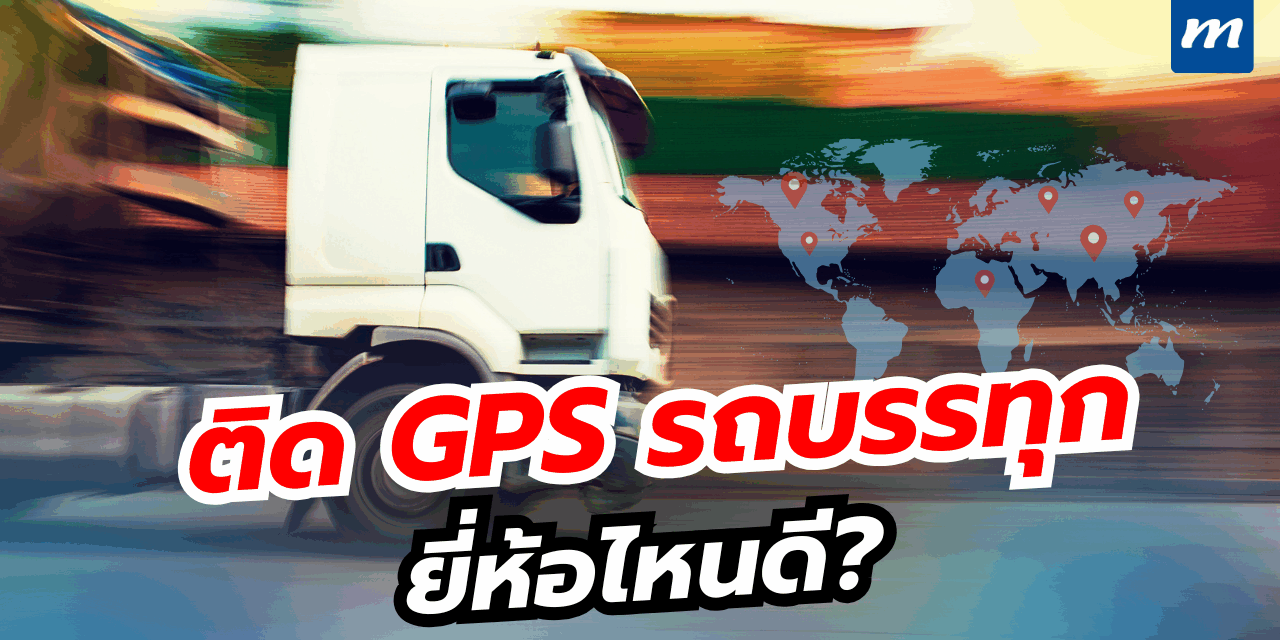Which Truck GPS Is the Best? A Guide to Choosing the Right GPS for Thai Logistics Businesses
Why Do Trucks Need GPS Tracking?
In the logistics and transportation industry, trucks are the “lifeblood” of Thailand’s economy. However, business operators often face major challenges such as high fuel costs, accident risks, fraud, and difficulties in managing large fleets. กรมการขนส่งทางบก (DLT) จึงกำหนดให้รถบรรทุกสาธารณะ รถโดยสาร และรถลากจูงทุกคันต้องติดตั้ง GPS Tracking เพื่อให้สามารถตรวจสอบตำแหน่งการวิ่ง ความเร็ว และเวลาการขับขี่ได้แบบเรียลไทม์ แต่ในทางปฏิบัติ GPS ไม่ได้มีแค่ “ทำตามกฎหมาย” เท่านั้น หากเลือกยี่ห้อที่ดีจริง จะช่วยคุณได้มากกว่านั้น เช่น การลดต้นทุน เพิ่มประสิทธิภาพ และทำให้ธุรกิจแข่งขันได้ในระยะยาว
Key Criteria for Choosing the Right Truck GPS
1. DLT Certified and Future-Ready
The GPS device must be certified by the Department of Land Transport (DLT) and should support 4G or higher networks. Since the government plans to phase out 2G/3G networks within the next 1–3 years.
2. Functions That Meet Real Operational Needs
- Manage a large number of vehicles efficiently.
- Track the real-time location of every vehicle.
- Generate speed and vehicle usage reports individually or for the entire fleet.
- Receive entry and exit alerts (Geo-fence), such as notifications when trucks enter restricted fuel areas, rental vehicles reach border zones, or delivery trucks arrive at their destinations.
- Shut down the engine in emergencies, such as in the event of an accident.
- Connect with MDVR (Mobile Digital Video Recorder).
- Data system for analytics, including maintenance cost forecasting, registration and tax reminders, and fuel consumption analysis.
3. After-Sales Service
Many low-cost GPS devices often lack technical teams or call center support, causing business operators to spend more time resolving issues when problems arise. Therefore, choosing a brand that offers service centers, technical support teams, and a dedicated call center is just as important to your business as the device itself.
4. Cost Efficiency and Payment Options
Some brands sell GPS devices outright with an annual service fee (for cloud or internet SIM), while others offer rental-based plans. It’s important to consider long-term value rather than just the initial price. Additional factors such as warranty terms and service conditions should also be taken into account.
Which Truck GPS Brand is Best? Market Comparison
1. Budget-Friendly Tier (฿3,000–4,000)
Suitable for personal vehicles or small businesses, such as car rental fleets with 5–10 vehicles. The main advantage is the low price, but the systems are often unstable and after-sales service is minimal or nonexistent.
2. Standard Tier (DLT-Certified)
Many low-cost GPS devices often lack technical teams or call center support, causing business operators to spend more time resolving issues when problems arise. Therefore, choosing a brand that offers service centers, technical support teams, and a dedicated call center is just as important to your business as the device itself.
3. Enterprise/Fleet Tier (Large-Scale Operations)
There are more advanced systems, such as an integrated MDVR and GPS platform, a TMS (Transport Management System) for routing operations, and data-analytics software to support fleet managers in decision-making. These come at a higher price, but deliver better efficiency and safety.
MonoGPS: More Than Just GPS Tracking
1. Standards and Reliability
- For Department of Land Transport (DLT) Certification
- Trusted by leading corporate clients such as Caterpillar, Ford, and Yusen Logistics for both GPS and IoT solutions.

2. All-in-One Functional System
- GPS Tracking industry
- Online MDVR (In-Vehicle Camera System for Transport Use)
- Rack & Dolly Tracking for Manufacturing Management
- Safety Blind Spot Detection (Blind Spot Monitoring Camera System)
- IoT system connecting machines and devices into a unified dashboard.
3. After-Sales Service
- Call Center available daily, 08:00–20:00.
- Nationwide field technician teams providing service in accordance with SLA.
- Customer satisfaction rate as high as 95–99%.
4. Flexibility
MonoGPS offers flexible packages for both single trucks and large fleets with hundreds of vehicles. The system can be customized to meet specific operational needs — such as TMS integration or trailer management — without requiring additional GPS installations.
Success Stories
- A leading heavy machinery manufacturer in Thailand reduced its Rack management staff from 5 to just 1 person with the Rack Tracking system.
- A logistics client installed MDVR and blind spot detection cameras on forklifts to enhance safety within the warehouse area.
- Amarin Engineering & Transport uses MDVR to monitor high-value goods, featuring a video recording system with 60-day playback capability.

FAQ: Frequently Asked Questions
Q: Do all trucks need to have GPS installed?
A: Public trucks and towing vehicles, as required by the Department of Land Transport (DLT), must have GPS installed. Failure to install the system is considered a violation of the law.
Q: How much does it cost to install a GPS for trucks?
A: Prices start from 3,000 THB for basic devices and go up to over 10,000 THB for full-featured systems.
Q: Can GPS Data Be Used as Legal Evidence?
A: Yes, provided the data is properly recorded and authenticated. This typically includes recording speed, time, and accompanying video footage from an MDVR system.
Summary: Which Brand of Truck GPS is Best?
- For those operating just a few trucks, opting for a budget-friendly GPS solution may be sufficient.
- However, if you are a logistics business or a large-scale organization, the answer is not merely 'the cheapest device,' but rather a comprehensive system that strengthens your business in the long term.
MonoGPS is not just a GPS device; it is a comprehensive solution for fleet management and safety. Contact us for inquiries at Contact Information. MonoGPS Contact Page

